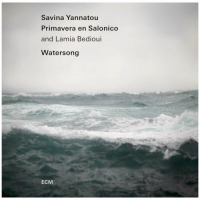Home » Jazz Articles » Album Review » Savina Yannatou & Primavera en Salonico with Lamia Bedio...
Savina Yannatou & Primavera en Salonico with Lamia Bedioui: Watersong
Researching the program, Yannatou fell under the spell of Sándor Ferenczi, a Hungarian psychoanalyst and colleague of Sigmund Freud. In a 1924 monograph entitled Thalassa (The Sea), Ferenczi conceived of sexual desires as biological adaptations to catastrophic climate changes, millions of years ago. We still long to return to the mother ocean, he argued, as represented by the fluid world of the womb. Our dreams and drives reflect this fundamental yearning. Whether Ferenczi's notions hold water, they moved Yannatou, leading her toward songs from diverse cultures over time, enigmatic and hydrous tales.
Each selection on the album offers a distinct musical world, with liner notes providing evocative lyric snippets to spark the imagination. The program begins with Vomvolos' quietly beautiful arrangement of "The Song of Klidonas," a simple "silent water" evocation of St. John, which stems from an ancient summer solstice ritual.
The striking second track mixes pieces from two different cultures, combining them as if to express opposing views of a single story. Bedioui enters first with "Naanaa Algenina (Garden Mint)," an Aswan tune that speaks of a heavenly garden infused with the juicy scents of lovemaking and mint. Lambrakis' nay follows softly, creating a droning bridge for "Ivana," a North Macedonian song about a thirsty seducer with fishy motives, which Yannatou sings simultaneously, in a kind of harmonized heterophony. Voices and instruments intermingle in an increasingly dense texture that leads to an abstract improvisatory section, eventually receding back into the song, as if awakening from a dream.
Bedioui is particularly strong on "Mawal (To the Mourning Dove, I Said)," a 10th-century poem set by celebrated 20th-century Iraqi singer Nazem al-Ghazali. Primavera en Salonico's arrangement is characteristically eerie and otherworldly. She reads the poem at the outset, speaking over Doneff's ominous percussive rumblings. Yannatou enters quietly, improvising beneath, behaving like a barely intelligible interior voice, a murmuring undercurrent. Goventas' violin joins in to support the melody as Bedioui begins the song with a haunting cry and a stunning vocal ornament that explodes softly, emulating the trilling sound of the dove ("I had to shed tears, but my tears, in misery, are rare").
"Full Fathom Five," by English composer and lutenist Robert Johnson (ca. 1583-1633), Shakespeare's frequent collaborator, anchors the program. Yannatou has had the tune in her repertoire for years, since she began to sing Early Music professionally. Shakespeare wrote the lyric for The Tempest, as the second stanza of "Ariel's Song" (below).
Full fathom five thy father lies.
Of his bones are coral made.
Those are pearls that were his eyes.
Nothing of him that doth fade,
But doth suffer a sea change,
Into something rich and strange...
Popular in its time, "Full Fathom Five" has continued to resonate through the centuries. Artists as dissimilar as Igor Stravinsky, Marianne Faithfull, Sylvia Plath, Jackson Pollack, Pete Seeger, Henry Purcell, TS Eliot, Alfred Hitchcock, Caroline Shaw, Laurie Anderson, Susie Ibarra, Wadada Leo Smith and John Zorn have interpreted, interpolated and referred to it in various ways. Percy Bysshe Shelley has a line on his gravestone, and the phrase "sea change" has wormed its way into contemporary discourse.
Yannatou was drawn to the magical transformations in the lyric, which she finds macabre but somehow comforting. "It is death," she observed, "but the body is transformed into something very magical and nice, something from the bottom of the sea." In Watersong, she and Doneff create an aqueous soundscape that begins with her wispy wordless mutterings and his bowed waterphone, a metallic water-filled pot from which he draws ethereal harmonics, soft and distant-sounding. She sings the melody in a voice that could well be that of the spirit Ariel.
Discussing her influences in an interview with AAJ shortly before the release of Watersong, Yannatou spoke of being deeply affected by the soundtracks of Peter Brook's Mahabharata (1989) and Pier Paolo Pasolini's "Medea" (1969). These films "threw me into the world of 'world music,'" she said, "where I am wandering until today as if through fairy tales." Thinking of the Brothers Grimm, the analogy resonates. The sonic realms she and her collaborators lead us into on Watersong are enchanting, mysterious, sometimes dark and always unforgettable.
Track Listing
The Song Of Klidonas; Naanaa Algenina (Garden Mint), Ivana; Ai Giorkis (Saint George); A Los Baños Del Amor (At The Baths Of Love); Perperouna; Con Qué La Lavaré? (With What Shall I Wash It?); Sia Meldetta L'Acqua (Cursed Be The Water); Mawal (To The Mourning Dove, I Said); Kalanta Of The Theophany; The Immortal Water; Full Fathom Five; An Ròn (The Seal); O Onda (O Wave); Wade In The Water, Allah Musau (God Of Moses).
Personnel
Savina Yannatou
vocalsSavina Yannatou & Primavera en Salonico
band / ensemble / orchestraLamia Bedioui
vocalsHarris Lambrakis
fluteAdditional Instrumentation
Kostas Vomvolos: qanun, accordion; Harris Lambrakis: nay; Kyriakos Gouventas: violin; Yannis Alexandris: oud; Michalis Siganidis: double bass; Dine Doneff: percussion.
Album information
Title: Watersong | Year Released: 2025 | Record Label: ECM Records
Tags
PREVIOUS / NEXT
Support All About Jazz
 All About Jazz has been a pillar of jazz since 1995, championing it as an art form and, more importantly, supporting the musicians who make it. Our enduring commitment has made "AAJ" one of the most culturally important websites of its kind, read by hundreds of thousands of fans, musicians and industry figures every month.
All About Jazz has been a pillar of jazz since 1995, championing it as an art form and, more importantly, supporting the musicians who make it. Our enduring commitment has made "AAJ" one of the most culturally important websites of its kind, read by hundreds of thousands of fans, musicians and industry figures every month.





















